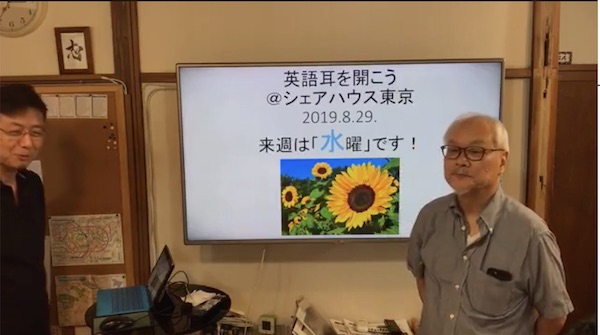
お二人の講師のダブル来校。
(一部音声がミュートされています)
句動詞の音変化について
定義
Unit 14
語尾の子音と語頭の母音がつながって1つの音になる
POINT:cook out 屋外で料理する
cookの語尾の子音[k]とoutの語頭の[a]がつながり、「クック・アウト」ではなく、「クッカウト」のように聞こえます。
今回は「句動詞(くどうし)」(phrase verb)を取り上げる。
句動詞は「動詞+副詞」や「動詞+(副詞)+前置詞」という2語または複数語で特別な意味をなすフレーズ。
動詞ともう1語がつながることで、動詞が持っている音節ではなく、つながったところにアクセントが発生する。
cookだけだと、「クッ」クと頭にアクセントが発生する。
しかしcook outだとクッ「カ」ウトと「カ」にアクセントがある。
これは名詞としても使われることがあり、その場合は語頭にアクセントが移るcook outの場合
動詞:クッ「カ」ウト
名詞:「クッ」カウト
となる。
例題
- Look out from the window.
- It’s time to wake up.
- Look up and say it.
- Make up your mind now.
- I was sick in bed yesterday.
- What time are you going to check in?
- Time flies like an arrow.
- Look at the time.
- There’s a clock on the wall.
- I found it in the back of the room.
和訳
- 窓から外をみてごらん
- 起きる時間ですよ
- 顔を上げて言ってごらんなさい
- もう決心しなさい
- 昨日は病気で寝ていました。
- 何時にチェックインですか
- あっという間に時間が経ったね
- もうこんな時間だ
- 壁に時計がかかっているよね
- これ、部屋の後ろで見つけたよ。
解説
1 Look outは句動詞で「外を見る」。ルッ「カ」ウと「カ」にアクセントがある。
2 wake upは句動詞で「目を覚ます」。ウェィ「カ」ップと「カ」にアクセントがある。
3 Look upは句動詞で「顔を上げて見る」。ルッ「カ」(プ)と「カ」にアクセントがある。
4 Make upは句動詞でいくつかの意味がある。名「カ」ップと「カ」にアクセントがある。
Make up your mind で「決心しなさい」という慣用句になっている。
なお参考までにin your mindは「(頭の中に)」というニュアンスで、on your mindは「(表面にくっついている)」というニュアンス。
5 sick inは句動詞ではない。I was sickとin bedと分かれる。なのでsickとinはくっついて発音されるようだが、実際は切って発音するのが筋。
アクセントもsickが持っている「シッ」クにある。
6 check inは句動詞で「チェックインする」。チェッ「キ」ンと「キ」にアクセントがある。
7 rの音はLよりもwに近い。LはTに近い。
arrowも「アロー」ではなく、「アゥオー」のように聞こえる。
8 Look atは句動詞ではないがLook at the timeで「もうこんな時間だ」という慣用句として使われる。
9 There’s clockとon the wallは本来切れるので、clock on はつながるように聞こえるが気持ちは切って発音が筋。
a clockがtheでないのは、「単に”時計”」といいたいから。何か特定されるような時計(“例の時計”みたいに)の場合はtheが付き、That’s the clockみたいな言い方が自然。
10 found it in は句動詞ではない。found itとin the back of the roomは切れる。
in the back of the roomは「部屋の後ろの方」をいうのに対し、
in back of the room は「部屋の外の裏側」とthe がつかないだけで意味は大きく異る。
in the front of とin front ofの違いもそう。
句動詞の例
ちょっと調べてみました。
get up、take off、look forward to、carry outなど。
weblioに句動詞一覧表がありましたのでご参考まで。
ちなみにmake outも句動詞のようです(^^)
会話練習
先の例文をつかって会話練習。
会話練習は感情を込めると効果的。
例文
1.
A: Look out from the window.
B: No I can’t.
A: How come? You have no head for heights?
2.
A: It’s time to wake up.
B: Five more minutes, please.
A: No. You’ll be late.
3.
A: Look up and say it.
B: I’ll try.
A: Go ahead. I’m listening.
4.
A: Make up your mind now.
B: I know I should.
A: You’d better hurry.
5.
A: I was sick in bed yesterday.
B: No wonder I didn’t see you.
A: Did I miss anything?.
6.
A: What time are you going to check in?
B: I don’t know yet.
A: You’d better call the hotel.
7.
A: Time flies like an arrow.
B: Yes, I’ve really enjoyed working with you.
A: Pleasure is mine.
8.
A: Look at the time!
B: Didn’t you know?
A: My watch is slow.
9.
A: There’s a clock on the wall.
B: My sister gave it to me.
A: Hey, isn’t that nice?
10.
A: I found it in the back of the room.
B: Oh, you have a good eye.
A: I do, don’t I?
和訳
1.
A: 窓から外を見てごらん。
B: ダメ。できない。
A: 何故? 高所恐怖症かい?
2.
A: 起きる時間です。
B: お願い、あと5分。
A: ダメ。遅れますよ。
3.
A: 顔を上げて、言ってごらん。
B: やってみます。
A: どうぞ。聞いてます。
4.
A: もう決心しなさい。
B: わかってるよ。
A: 急いだ方がいいよ。
5.
A: 昨日は、病気で寝ていました。
B: どおりで、見なかった。
A: 何か、逃したものある?
6.
A: 何時にチェックインの予定ですか?
B: まだわからない。
A: ホテルに電話した方がいいのでは?
7.
A: 「光陰矢の如し」ですね。
B: 本当に。一緒に働けて楽しかったです。
A: こちらこそ。
8.
A: もうこんな時間だ!
B: わからなかなかったの?
A: 時計が遅れているんだ。
9.
A: 壁に時計がかかっているよ。
B: 妹がくれたんだ。
A: へえ、それはいいね。
10.
A: これ、部屋の後ろで見つけたよ。
B: おお、良い目をしているね。
A: だろう?
解説
1. How come?単独で使うときはcomeにアクセント。How come〜?と文章を使うときはHowにアクセント。
no head for heightsで高所恐怖症。
4. I know I shouldでI knowだけにするとぶっきらぼうな印象を与える。
7. Pleasure is mine. に対しNo it's mine.と返すと「いやいやこちらこそ」というニュアンスが伝わる。
8. My watch is slowと「時計が遅れている」はslowを使う。「時計が遅い」という感覚。「時計が進んでいる」はfastを使う。
9. Hey, isn’t that nice?でisn’tを使っているのは付加疑問文のように表現している。
10. I do, don’t Iでdo、Iはいずれも語尾を下げる
洋画で文意語ディクテーション
今回はグレイテストショーマンの主題歌「THIS IS ME」
オフィシャルムービーはこちら
The Greatest Showman Cast - This Is Me (Official Lyric Video)
課題
When the sharpest [ ] wanna [ ] me down
I'm gonna send a [ ], gonna [ ] them out
I am [ ], I am [ ]
I am who I'm [ ] to be, THIS IS ME!
Look out 'cause here I [ ]
And I'm [ ] on to the beat I drum
I'm not [ ] to be [ ]
I make no [ ], THIS IS ME!
回答
When the sharpest words wanna cut me down
I'm gonna send a flood, gonna drown them out
I am brave, I am bruised
I am who I'm meant to be, THIS IS ME!
Look out 'cause here I come
And I'm marching on to the beat I drum
I'm not scared to be seen
I make no apologies, THIS IS ME!
語彙解説
flood 洪水
drown 溺れる
bruised 傷ついた
mean to be 〜であるはずだ
歌って練習
一部の単語だけを口にするように歌ってみる。
以下の薄い色は口に出さずに歌のペースに合わせてみる。
When the sharpest words wanna cut me down
I'm gonna send a flood, gonna drown them out
I am brave, I am bruised
I am who I'm meant to be, THIS IS ME!
Look out 'cause here I come
And I'm marching on to the beat I drum
I'm not scared to be seen
I make no apologies, THIS IS ME!
一捻りした表現
色が薄く線が引かれている単語で別の表現を考えてみる。
1.
A: What did you do on the weekend?
B: I went to a concert by the Berlin Philharmonic.
They gave an wonderful performance.
A: Sounds great.
wonderful -> exceptional
2.
A: That actress looked beautiful in that red dress.
B: I know! We couldn’t help staring at her.
beautiful -> stunning
3.
A: Who was chosen as the new manager?
B: Ms. Williams. She’s a able person.
A: That’s good to hear.
able -> competent
4.
A: Malik’s always exploring new and interesting ways to express himself
--- music, art, fashion…
B: I know --- he’s so unique.
unique -> original
5.
A: We need to update all the statistics in the report.
B: Already done.
A: Good! Keep up the good work!
Good -> impressive
6.
A: What are you wearing to the wedding?
B: I don’t know. I really don’t have any nice suits.
A: Well, maybe it’s time you went shopping for some.
nice -> decent
7.
A: What a view!
B: It’s beautiful, isn’t it?
A: You were right --- it’s certainly worth the five-hour climb.
beautiful -> breathtaking
句動詞は4月にやった第15回の内容の復習。
まだまだ身につけられていないことを思い知らされます(^^)
これから、これから(^^)